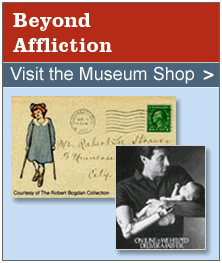Curriculum Standards And Disability History
Because people with disabilities have played important roles across all aspects and periods of human endeavor, disability history provides a rich source for the social studies. Each Lesson Cluster in the DHM identifies relevant national standards. These readily align with state standards.
The Curriculum Standards for Social Studies address overall curriculum design and comprehensive student performance expectations, while the National Standards for History provide focused and enhanced content detail. Access the full National Standards for History (1996) from the National Center for History in the Schools, University of California, Los Angeles: http://nchs.ucla.edu/ Access the full Curriculum Standards for Social Studies (1994) from the National Council for the Social Studies: http://www.socialstudies.org/
Curriculum Standards for Cluster:
"Hearing Voices": The Campaign For Moral Treatment
UCLA NATIONAL HISTORY STANDARDS:
Era 4: Expansion and Reform (1801-1861)
STANDARD 4: The sources and character
of cultural, religious, and social reform movements in the antebellum
period.
4B The student understands how
Americans strived to reform society and create a distinct culture.
- Explain the importance
of the Second Great Awakening and the ideas of its principal leaders.
[Examine the influence of ideas.]
- Assess how the Second Great
Awakening impinged on antebellum issues such as public education, temperance,
women's suffrage, abolition, and commercialization. [Analyze cause-and-effect
relationships.]
4C The student understands changing
gender roles and the ideas and activities of women reformers.
- Analyze the activities
of women of different racial and social groups in the reform movements
for education, abolition, temperance, and women's suffrage. [Examine
the importance of the individual.]
NCSS STANDARDS:
Overview: This lesson cluster requires
analysis of individual rights and the role of the government in protecting
them. Lessons examine the role of reformers, especially women, in advocating
for the care of people with disabilities. President Pierce's veto of
the "Dix Bill" marked an important early use of a states'
rights argument in debates over who bears responsibility for social
improvement.
I. Culture
Selected High School Performance
Expectations
a. analyze and explain the ways
groups, societies, and cultures address human needs and concerns;
IV. Individual Development &
Identity
Selected High School Performance
Expectations
i. examine factors that contribute
to and damage one's mental health and analyze issues related to mental
health and behavioral disorders in contemporary society.
V. Individuals, Groups, & Institutions
Selected High School Performance
Expectations
a. Apply concepts such as role,
status, and social class in describing the connections and interactions
of individuals, groups, and institutions in society.
b. Analyze group and institutional
influences on people, events, and elements of culture in both historical
and contemporary settings.
c. Describe the various forms
that institutions take, and explain how they develop and change over
time.
d. identify and analyze examples
of tensions between expressions of individuality and efforts to promote
social conformity by groups and institutions;
e. Describe and examine belief
systems basic to specific traditions and laws in contemporary and historical
movements.
f. Evaluate the role of institutions
in furthering both continuity and change.
g. Analyze the extent to which
groups and institutions meet individual needs and promote the common
good in contemporary and historical settings.
h. Explain and apply ideas and
modes of inquiry drawn from behavioral science and social theory in
the examination of persistent issues and social problems.
VI. Power; Authority, & Governance
Selected High School Performance
Expectations
a. examine persistent issues
involving the rights, roles, and status of the individual in relation
to the general welfare;
c. analyze and explain the ideas
and mechanisms to meet needs and wants of citizens, regulate territory,
manage conflict, establish order and security, and balance competing
conceptions of a just society;
X. Civic Ideals and Practices
Selected High School Performance
Expectations
a. explain the origins and continuing
influence of key ideals of the democratic republican form of government,
such as individual human dignity, liberty, justice, equality, and the
rule of law;
b. identify, analyze, interpret,
and evaluate sources and examples of citizens' rights and responsibilities;
c. locate, access, analyze, organize,
sythesize, evalute, and apply information about selected public issuesâ??identifying,
describing, and evaluating multiple points of view;
e. analyze and evaluate the influence
of various forms of citizen action on public policy;
g. evaluate the effectiveness
of public opinion in influencing and shaping public policy development
and decision-making;
h. evaluate the degree to which
public policies and citizen behaviors reflect or foster the stated ideals
of a democratic republican form of government;
i. construct a policy statement
and an action plan to achieve one or more goals related to an issue
of public concern;






